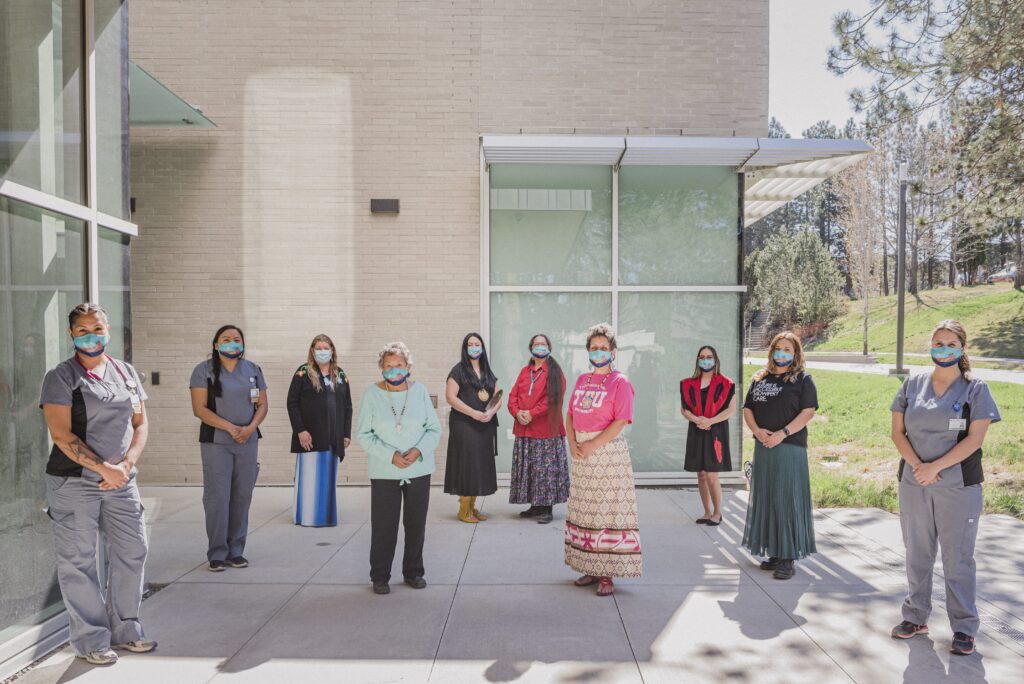
RESEARCH COORDINATOR
- Tina Lanceleve

Undergraduate Students
- Nikki Fraser, Bachelor of Arts
- Wenona Johnny
- Wynona Cahoose
- Katherine Bermiller
- Levi Mason

Wenona Johnny is from the Texelc First Nation, born and raised in the interior region. She is a second year Nursing student in the bachelor of science in nursing program at TRU. She has previously worked in the health Care field working with the First Nations communities in and around Williams Lake for the last eight years. It was working within these communities that she became increasingly aware of the growing gaps in health care serves to rural and remote First Nations communities and enticed her to pursue a career in nursing. I am a mother to two handsome boys and it is them that drive me to thrive within my life and my future. I look forward to learning more about generating health care information so that it betters serves our Nations.
Graduate Students

Dawn Tisdale RN, BSN, MSN in progress is of Mi’kmaq and European ancestry. Dawn started nursing in medical and palliative care before moving into nursing policy and advocacy with a specific focus on Indigenous health and nursing initiatives. Dawn’s advocacy efforts have been in Indigenous nursing leadership and adopting cultural safety within health care systems and nursing education. Dawn’s scholarship is committed to creating culturally safe health care to address anti-Indigenous racism and promoting the rights of Indigenous-led health care.

Rose Melnyk is a proud member of St’uxwtéws te Secwépemc and has resided in Secwepemcul’ecw her entire life. Rose has practiced as a registered nurse since 2008, and since 2015 has worked as an Aboriginal Health Practice Lead in Interior Health. She is currently enrolled in the Master of Nursing program at TRU and is passionate about advancing health equity for Indigenous persons, families, and communities.
PREVIOUS Students

Amy Mawdsley is White (Irish, Scottish, Russian and English) and Cree on her mother’s side. She lives on the unceded, ancestral territories of the Tsleil-Waututh, Squamish and Musqueam Nations. She has been privileged to finish a Masters in Public Health in which she focused on ethics, community-based approaches, and social determinants of health. Her greatest learnings have been from the women, Elders and children in her life. Over the last several years, she is grateful to have worked with community-based organizations in Indigenous health. Currently, she is a Research Assistant with the Nursing the Nuu-Chah-Nulth Way project. She is humbled by this work and am always learning. She is passionate about supporting meaningful change towards a more just, healthy, anti-racist, respectful and connected future.

Christina Chakanyuka was born and raised on Dene/Cree territory in the South Slave (Treaty 8) Region of the Northwest Territories. She has strong family ties to both her father’s Scottish relations as well as her mother’s British, Dene, and Cree-Métis relations. She started her career as a Registered Nurse in her home community of Fort Smith before moving to Victoria, BC via Yellowknife, NT. She is now a part-time Assistant Professor and full-time PhD student in the School of Nursing at the University of Victoria. She is thankful to the Indigenous nurse matriarchs who have bushwhacked and cleared a path in the snow for Indigenous worldviews, and ways of knowing, doing, and being to be recognized in the nursing academy. As an“Indigenist” nurse educator and budding scholar, she is committed to working collectively with Indigenous people and allies in research-activism that aligns with and guided by the core tenants of anti-oppression and anti-racism. In her future research, she intends to embody relational accountability to self, to others, to community, and to creation through decolonizing efforts within the nursing academy.
Robline Davey, M. Ed.
Robline (Robbi) Davey is currently a PhD student at SFU, completed a Masters of Education in 2019 and works at TRU as the Indigenous Experiential Learning Department. Robbi’s research interests include exploring the way distance learning and digital spaces can provide increased access to post-secondary education for Indigenous students. Other research interests include revitalizing cultural practices, traditional food, and technology to bolster Indigenous health and well-being as well as exploring Indigenous intersectional feminist identities. Recently Robbi worked on successful interdisciplinary community-driven CIHR and SSHRC grant applications, was awarded the Ken Lepin Graduate Research Award (2018), British Columbia Graduate Scholarship (2019), and Dean’s Graduate Entrance Scholarship at SFU (2020).
